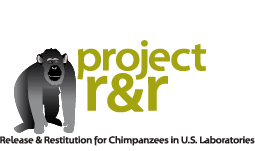October 6, 2008 • Posted in Project R&R News
"A return to the use of chimpanzees in AIDS research and vaccine development is without scientific justification,” according to a paper released in 2008 in the journal Alternatives to Laboratory Animals (ATLA). "An Assessment of the Role of Chimpanzees in AIDS Vaccine Research" concludes that vaccine responses in chimpanzees are not predictive of responses in humans, and that claims of chimpanzees' critical role and importance in AIDS vaccine development are without foundation.
The publication comes on the heels of recent vaccine failures in late-stage clinical trials, including one vaccine that appeared to increase vulnerability to HIV infection in human clinical trial participants, though the vaccine had proven safe and effective in tests in nonhuman primates. Yet some scientists are calling for a return to the use of chimpanzees, despite their previous failings.
Other scientists doubt that a return to their use would lead to likely success. According to the paper’s author, geneticist Jarrod Bailey, Ph.D., Science Director for Project R&R: Release and Restitution for Chimpanzees in U.S. Laboratories: "At a cost of billions of dollars, most of the 85 AIDS vaccines created to date have been tested in hundreds of chimpanzees who endured decades of experiments and laboratory confinement. Almost all of these vaccines protected chimpanzees from HIV infection, but none has worked in humans. Claims of the continued importance of chimpanzee use are therefore misleading. For the millions of people at risk of AIDS, as well as the chimpanzees, we must move toward more humane and scientifically superior methods."
Chimpanzees have proven to be a failed and dangerous model for humans in not only AIDS research but in areas such as heart and cancer research as well.
In a May 2008 essay in Nature, NIAID Director and AIDS expert Dr. Anthony Fauci, when reflecting on the era of HIV/AIDS, noted: "We must learn from our missteps, build on our successes in treatment and prevention, and renew our commitment to developing the truly transforming tools that will one day put this scourge behind us."
According to Dr. Bailey, "The search for such a critically needed ‘transforming tool’ cannot include a return to using chimpanzees, one of the greatest ‘missteps' in the history of AIDS research."

